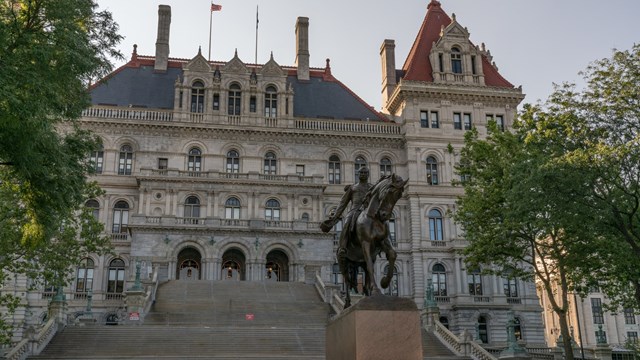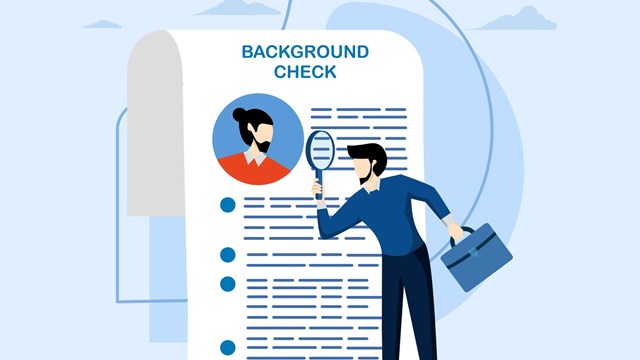With all the recent grief and confusion in our city, it’s almost easy to forget that there was a mayoral primary scheduled for September 11th. Voting had barely started when terror descended on New York. As images of destruction and chaos dominated the media and our everyday lives, the idea of voting in a new mayor seemed the furthest thing from our collective mind.
As the days rolled on, however, it became clear that one of the most powerful ways to express our strength and cohesion as a city was to preserve our democratic process and continue with the election as planned. Though the mayoral hopefuls who had been campaigning so stridently in the months prior to the attacks on New York and Washington, D.C. fell silent in the wake of the disasters, campaign volunteers reemerged to remind us all to vote on September 25th, distributing fliers and replacing tattered campaign posters.
The question of who will be mayor after the general election in November is hardly cut-and-dry; Mark Green–the City’s Public Advocate, and considered by many to be the Democratic favorite–watched his lead over the competition dwindle as Bronx Borough President Fernando Ferrer came from behind to gain support among minority voters and moderate Democrats late in the race. The two candidates fought to a near-draw on September 25th, necessitating a run-off to determine who will square off against Republican primary victor and media mogul Mike Bloomberg in November.
As if things weren’t ambiguous enough, the issue has now been further complicated by suggestions from the public and media alike that perhaps Mayor Giuliani should petition the City Council and State Legislature to allow him to serve another term, in light of his undeniably stellar performance in the aftermath of the WTC tragedy. Though current term-limit laws would technically prevent a third Giuliani term, it’s not inconceivable that such an unprecedented time as this might necessitate an unprecedented exception.
For now, however, democratic process has won the day, and New Yorkers now have some choices to consider before the Main Event in November. Our next mayor will not only face the dizzying task of nursing the City back to robust health and repairing the damage wrought on September 11th, but he will also have the unenviable job of running the day-to-day life of the biggest, most complicated city in America. Says Mary Ann Rothman, executive director of the Council of New York Cooperatives and Condominiums (CNYC), "The entire city is going to change. We’re going to have novices in a large number of roles … we hope that the new administration will keep [our issues] a priority and come up with some real solutions. This new mayor will have to walk a fine line between the needs of tenants and the promises made to developers."
Warren Wechsler, first senior vice president of the Real Estate Board of New York (REBNY) notes that "the overall state of the city is what we [real estate professionals] consider most important to the people who have invested in the long term by purchasing real estate in New York City. The most important thing a mayor can do is run the city in a way that encourages people to live here."
How our new mayor tackles issues like housing, property taxes, and zoning will affect all of us–renters, homeowners, and shareholders alike. The Cooperator recently asked the 2001 mayoral finalists some questions about how their proposed policies and strategies will impact the co-op and condo-dwelling community and how they plan to keep New York City the vibrant, vital place it is.
Mark Green, Public Advocate, Democrat
Are you a co-op/condo owner? Where?
Yes, I have a cooperative on the Upper East Side.
What real estate-specific laws and programs have you supported or opposed in your past and present legislative positions?
I have always been an advocate for tenants. In 2000, I spoke out against vacancy de-control under the 1997 Rent Act and wrote to Governor Pataki to stop the adoption of revisions made to the Rent Stabilization Law without input from tenant advocates.
Are there any policies you plan to amend or abolish?
I am strongly opposed to the "poor tax," the supplementary rent increase of $15 for apartments rented for under $500 and also believe that the $2000 monthly rent threshold for vacancy decontrol should be raised. In order to spur housing development, I will revise or eliminate unnecessary government policies and practices that keep housing construction costs unnecessarily high and allow corruption to thrive.
What is your view of the current state of New York City real estate?
I believe that the City’s real estate market has long suffered from a crisis of housing shortage. More than 25,000 New Yorkers, including over 10,000 children and working parents, sleep in the City’s shelter system while the list of families and individuals waiting for public housing and Section 8 vouchers reached to 300,000. I plan to address this crisis by creating 50,000 new housing units, redeveloping brownfields and reducing red tape to help all New Yorkers find decent, affordable housing.
Do you foresee a drop in prices?
Rather than speculating about the future, my plans address the problems of the present.
Where do you stand on the Mitchell Lama buyout issue?
I believe that New York must do everything possible to preserve and ensure the affordability of Mitchell Lama housing. During the buyout process, I realize the importance of protecting tenants’ rights and ensuring that the Department of Housing Preservation and Development does not approve buyouts by landlords who have violated regulations.
What is your planned approach to the current housing shortage, particularly low and middle-income housing?
With me as Mayor, the City will create 50,000 new units of housing in the next five years. I plan to provide $1 billion in new City funds to help build more housing by using sale and tax revenue from City buildings sold to private owners that go back on the tax rolls. I will also reform out-dated zoning regulations and building codes to eliminate obstacles to much-needed housing development. Building on my record and success in removing the mob from the carting industry, I will route out possible corruption in the construction industry and insulate new developments from the so called "mob tax."
Do you have a position on parity in property taxes for co-op owners?
I support the continuation of tax relief for co-op and condo owners, as proposed in the Mayors’ Executive Budget.
Where do you stand on the proposed West Side Stadium?
I do not support building a stadium on the West Side. Instead, the land, if more carefully planned, could be an attractive area for a mixed-use community, consisting of housing, commercial developments, and open space.
What do you feel is the most important component of a desirable community, and how do you plan to keep New York a desirable place to live?
As Mayor, I will focus relentlessly on educating children and protecting families. By improving City schools and ensuring everyone’s safety, I will make New York a far more desirable place to live. I will work to limit classes in K-3rd grades to just 20 students, make the Board of Education more accountable to New Yorkers by increasing Mayoral accountability, and integrate technology into classrooms. I will make sure that families are safe by fighting crime while reducing police misconduct. I will combine the high police per capita ratio of 1 to every 170 people with more community policing to improve relations between police officers and the neighborhoods they serve so that both crime and misconduct fall.
Fernando Ferrer, Bronx Borough President, Democrat
Are you a co-op/condo owner?
Yes, I own a co-op in Riverdale.
What real estate-specific laws and programs have you supported or opposed in your past and present legislative positions?
As Borough President, I sponsored the window-guards law as Chair of the City Council Health Committee. I also sponsored the original 421-A legislation and support J-51 legislation, co-op/condo tax equity, and the application of the Senior Citizen Homeowner Exemption (SCHE) and Veteran’s Exemption programs to co-op shareowners. My legislation would authorize the automatic upward adjustment of income limits to quality for SCHE benefits based on the cost of living to ensure seniors receive continuity of benefits. I oppose water and sewer rate increases to support filtration, and propose legislation to introduce accountability in the setting of those rates.
Are there any policies you plan to amend or abolish?
I want to look closely at the ICIP program to ensure benefits go to where inducements are needed to support economic development. I also want to amend the 421-A and similar programs to better capture its benefits to develop more affordable housing.
What is your view of the current state of New York City real estate?
Overall, the continued expansion and development reflects strength. Sound economic policies and improvements in public education will help strengthen neighborhoods. Some neighborhoods can benefit from targeted government assistance and planning, but the overall market appears strong.
Do you foresee a drop in prices?
My plan for co-op and condo tax equity should–in the long term–help increase sales prices for co-ops and condos.
Where do you stand on the Mitchell-Lama buyout issue?
My housing plan targets $100 million to help Mitchell-Lama rental and cooperative developments upgrade their physical plant.
What is your planned approach to the current housing shortage, particularly low- and middle-income housing?
To alleviate the affordable housing crisis in New York, I have proposed a plan that includes a ten-year commitment to housing with a $1.3 billion capital investment per year, including $300 million in City funds and $1 billion in leveraged sources. My plan builds on the Koch and Dinkins housing programs that were abandoned during the Giuliani administration. It would create new housing for low, moderate, and middle-income families, and aggressively preserve existing housing stock. The plan has a target production of 13,000 new units per year for 10 years and rehabilitation of 20,000 existing unites, for a total of 150,000 units over ten years.
Do you have a position on parity in property taxes for co-op owners?
My Real Estate Tax Reform plan would provide true property tax relief to true co-ops and condos.My revenue-neutral plan would enhance real estate tax collection without any hike in the tax rates or taxes for those who legally occupy their homes. My plan also nets the City $800 million to $1 billion while giving owners who occupy their co-op or condo $250 million in tax savings. This plan offers an incentive for owner-occupancy–rather than the current system, which favors those who live elsewhere and merely invest in housing units. A co-op becomes more valuable and provides additional equity for owners collectively for overall upgrades and individually for home equity for college or other personal needs. It also enables more residents to own where they live because lower real estate taxes reduce a cooperative’s overall mortgage escrow, which translate into lower co-op maintenance charges for cooperators. My plan responds to the 1996 and 1999 State Real Property Law amendments that required the City of New York to propose a plan to equalize co-op and condo real estate taxes (Chapter 273 of the laws of 1996 and Chapter 407 of the laws of 1999). City Hall and the Council failed to offer a plan as required by State legislation that allowed meager real property tax abatements for cooperatives and condos.
Where do you stand on the proposed West Side Stadium?
I think that it is wrong to spend a billion dollars on a new West Side stadium when we need to be investing in our schools, health care, and affordable housing.
What do you feel is the most important component of a desirable community, and how do you plan to keep New York a desirable place to live?
As the schools go, so go the neighborhoods–a familiar adage with much resonance in New York City. That’s all the more reason why it makes sense for all New Yorkers to fight for good public schools. Without access to educational opportunity, I wouldn’t be were I am today. That’s why I take the issue of education personally, and why I’m prepared to lead our schools in a bold, creative and intelligent direction by 1) creating a world-class and accountable teaching force. I believe that we must reform due process so that incompetent and unfit teachers are removed swiftly, that teachers work year-round and use the summer for intense professional development, and that we must offer teachers a 30 percent raise to recruit and retain the best instructors for our kids. 2) By creating safe places for our children after school. As Mayor, I will keep our middle schools open until 6pm on weekdays and on Saturdays and Sundays. We must alleviate the anxiety of working parents by offering our children a safe place to learn and play. Further, after school programs have been proven to increases student performance. 3) Improving the quality of education and access to CUNY. As Mayor, I will improve the quality of education at CUNY by realigning CUNY to the needs of the City, using it to train and retrain New Yorkers for economic advancement, and by investing in full-time faculty and making community colleges more accessible to New Yorkers.
Mike Bloomberg, founder, Bloomberg, L.P., Republican
Are you a co-op/condo owner? Where?
Yes, in Manhattan.
What real estate-specific laws and programs have you supported or opposed in your past and present legislative positions?
N/A
Are there any current policies you plan to amend or abolish?
As Mayor, I would establish criteria to evaluate the ongoing effectiveness of available tax abatement and exemption programs. Tax equity must be addressed as well. A policy on co-op/condo taxation should be established to avoid the need to petition the State legislature for tax relief every few years.
What is your view of the current state of New York City real estate?
Real estate drives the City’s economy. As such, we must ensure that real estate remain a thriving enterprise, especially as the economy begins to slow down.
Do you foresee a drop in prices?
I foresee an economic downturn that will require strong leadership and effective management to withstand.
Where do you stand on the Mitchell-Lama buyout issue?
As part of the Mitchell-Lama scheme, the government entered into an agreement with developers. Government should not amend the rules once they have been established. The preferable alternative is to facilitate the construction and preservation of affordable housing.
What is your planned approach to the current housing shortage, particularly low- and middle-income housing?
The task is daunting. We must increase the number of housing units by at least 100,000 and we must lower the cost of construction to make them safe, pleasant, maintainable, and affordable for all who live here. These two efforts must work in tandem to help us achieve the maximum benefit. This will require broad-based strategy that reduces barriers to development, facilitates the assembly of land, modernizes our zoning laws, and makes incentives available to those who need it to build affordable housing. Most importantly, it will require vision and leadership. And the government cannot and should not do it alone. The City must do all that it can to encourage, facilitate, and leverage private sector investment in affordable housing.
Do you have a position on parity in property taxes for co-op owners?
In 1996, Mayor Giuliani and the City Council requested the state legislature to enact a tax credit to offer some relief to co-op and condo owners. The City was to formulate a tax policy intended to achieve tax equity for co-op and condo owners, but this effort has not been undertaken. The tax credit program has been extended periodically, but without a long-term proposal in place. I would undertake a review of tax policy with the intent of establishing a permanent tax program so as to avoid the need for State legislation every few years to preserve the tax credit.
Where do you stand on the proposed West Side Stadium?
We must further develop the West Side. In doing so, we must initiate public-private partnerships, so to avoid depleting tax-based revenues.
What do you feel is the most important component of a desirable community, and how do you plan to keep New York a desirable place to live?
There are three areas that we must address in order to keep New York City a desirable place to live. First, we must build upon Mayor Giuliani’s successes in the fight against crime. While crime has declined over the last eight years, the job is not done. My public safety plan includes utilizing new technology to help the NYPD reduce crime, continuing the fight against quality-of-life offenses, and improving recruitment, training and community relations. Second, we must launch a genuine and effective effort to reform and improve public education in New York City and that starts with changing the system. The Mayor, with the advice and consent of the City Council, must have a Commissioner of Education who reports directly to him. Right now, the Board of Education is accountable to no one– and acts that way. As Mayor, I would strongly lobby the state Legislature to abolish the Board of Education. Until then, I would use my appointments to the Board, my influence in Washington and Albany, and my access to the news media to bring about lasting change to public education. Finally, we must conduct city planning the right way. That means obtaining and acting upon community input, not carrying out the whims of bureaucrats in government. In addition to engaging the local communities, we must ensure that they drive proposals forward. Increasing open space will attract more people to New York, which in turn will help the City’s economy thrive.







Leave a Comment